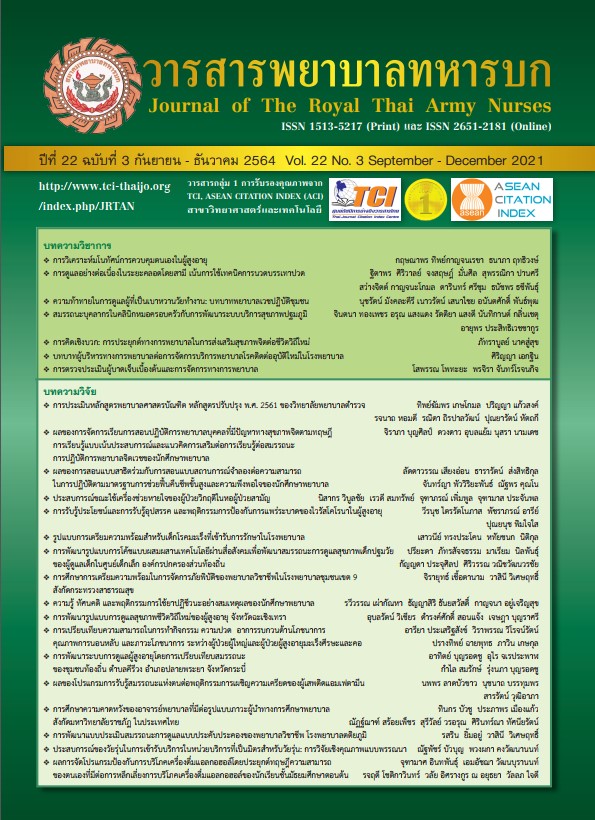The Effects of a Self-Efficacy Program on The Coping Behaviors of Amphetamine Dependent Patients
Keywords:
coping behaviors, self-efficacy, amphetamine dependence patientAbstract
This study was a quasi-experimental research using a two-group, pretest-posttest design. The purpose of this research aimed to examine the effects of a self-efficacy program on the coping behaviors of amphetamine-dependent patients. The subjects of this study were 62 amphetamine-dependent. This study was a quasi-experimental research using a two-group, pretest-posttest design. The purpose of this research aimed to examine the effects of a self-efficacy program on the coping behaviors of amphetamine-dependent patients. The subjects of this study were 62 amphetamine-dependentpatients aged between 18-60 years. The subjects were randomly assigned to an experimental andcontrol groups, with 31 patients in each group. The experimental group participated in the self-efficacy program, for 6 sessions, once a week, with each session lasting 60-90 minutes while the control group received routine care. The research instruments consisted of the self-efficacy program and the coping behaviors scale. The Cronbach’s alpha coefficient for the coping behaviors scale was .91. Descriptive statistics were used to represent the personal information of participants; a dependent t-test was use to compare the mean of the coping behaviors scores before and after the intervention in each group; and an independent t-test was used to compare the mean difference in the coping behaviors scores between the experimental and control groups.
The results of the study were as follows. 1) After participating in the self-efficacy program the mean scores for the coping behaviors of the experimental group (M = 122.52, SD=13.13) was significantly higher than before participating in the self-efficacy program (M = 51.03, SD = 2.94) at a statistical significance (t = 29.63, p <.001). 2) After participating in the self-efficacy program the mean difference for the coping behaviors between the pretest and posttest in the experimental group ( = 71.48, SD = 13.43) was significantly higher than those of the control group that received routine care (
= .03, SD = .84), at a statistical significance (t = 29.63, p <.001). The findings of the study suggest that the self-efficacy program was able to effectiveness increase the coping behaviors of the amphetamine-dependent patients.
Downloads
References
Lukanapichanachut L, Chaipichitpan N, Nilban S., et al, Princess Mother National Institute on Drug AbuseTreatment report. Department of medical services; 2019. (in Thai)
Wongpanarak N, Substance-related disorders. Mahasarakham: Mahasarakham University; 2019. (in Thai)
Wongsawan P, The behavior of teenagers Amphetamine Usage : A case study {dissertation}. Bangkoki: Srinakharinwirot University; 2009. (in Thai)
Houmhoul T, The objective was to study the self-esteem enhancement for adolescent patients with amphetamine-dependence. The Journal of Psychiatric nursing and mental health, 28(1), 81-91. (in Thai)
Lueboonthavatchai O, Psychiatric and Mental Health Nursing. Bangkok; 2006 (in Thai)
Panliaw P, The Effects of A Cognitive Behavior Therapy Program On The Aggressive Behaviors Among Patients With Amphetamine Dependence. Journal of The Royal Thai Army Nurses, 18 (suppl.1), 207-214. (in Thai)
Ritmoontree S, Violent behavior toward family of methamphetamine users. Journal of nursing science & health. 2011; 34(3): 48-56 (in Thai)
Lazarus, R.S. and Folkman, S, Stress, appraisal and coping. New York: Springer. 1984
Chaipichitpan N, Motivation enhancement therapy: Alternative care for drug abuser patient. Thammasat Medical Journal. 2013; 13(1): 98-108 (in Thai)
Bandura, A, Self-efficacy: The Exercise of Control. New York: W.H. Freeman. 1997
Laowilas S, Effects of Self-Efficacy Enhancement on Drinking alcohol, Outcome Perceive SelfEfficacy among Undergraduates students in Maejo University at Chumphon {dissertation}. Chumphon: Maejo University; 2014. (in Thai)
Ventura, J., Neuchterlein, K. H. Subotnik, K. L., et al, Self-Efficacy and neurocognition may be related to coping responses in recent-onset schizophrenia Research. 2004; 69: 343-352.
Phuakpong K, The Effects of An Empowerment Program on The Self-Control of Amphetamine Use Disorder Patients. Journal of The Royal Thai Army Nurses, 19, 118-128. (in Thai)
Kumlerd S, Development of Problem Solving Training Program Based on Acceptance and Commitment Therapy in Adolescents and Young Adults with Amphetamine Addiction. Journal of The Royal Thai Army Nurses, 20(1), 181-187. (in Thai)
Chokrung P, The effect of program to enhance perceived drug abstinence Self-efficacy on intention to drug abstinence among persons with amphetamine dependence {dissertation}. Chonburi: Burapha University; 2016. (in Thai)
Prateepteranun W, The effect of empowerment program on ability of suicidal attempters {dissertation}. Bangkok: Chulalongkorn University; 2013. (in Thai)
Jalowiec, A., Murphy, P., and Power J. Marjories, Psychometric assessment of Jalowiec coping scale. Nursing Research. 1984; 33(3)
Chaiwannawat T, Roles of psychiatric nurse for mental health promotion and mental illness prevention. The Journal of Psychiatric Nursing and Mental Health. 2017; 31(2): 16-30 (in Thai)
Kantha K, Factors related to suicide in Chun district Phayao province. Journal of Disease Prevention and Control: DPC 9th Phitsanulok. 2017; 6(1): 16-23 (in Thai)
Hongtiyanon T, The Effectiveness of perceived Self-Efficacy program for Assisting Adolescences towards behavior of Avoiding narcotics. Journal of The Royal Thai Army Nurses. 2019; 72(1): 33-40 (in Thai)
Wedcha C, Effects of Self-efficacy enhancement program on perceived drinking refusal Self-efficacy and alcohol dependence in alcohol dependence males {dissertation}. Mahasarakham: Mavnhasarakham University; 2015. (in Thai)
Downloads
Published
How to Cite
Issue
Section
License
บทความหรือข้อคิดเห็นใดใดที่ปรากฏในวารสารพยาบาลทหารบกเป็นวรรณกรรมของผู้เขียน ซึ่งบรรณาธิการหรือสมาคมพยาบาลทหารบก ไม่จำเป็นต้องเห็นด้วย
บทความที่ได้รับการตีพิมพ์เป็นลิขสิทธิ์ของวารสารพยาบาลทหารบก
The ideas and opinions expressed in the Journal of The Royal Thai Army Nurses are those of the authors and not necessarily those
of the editor or Royal Thai Army Nurses Association.






